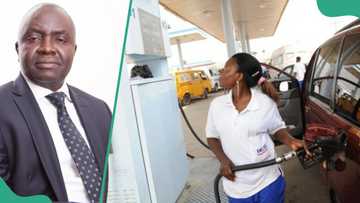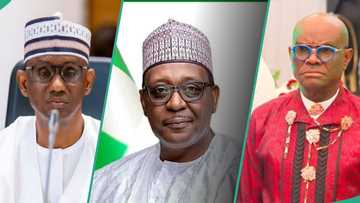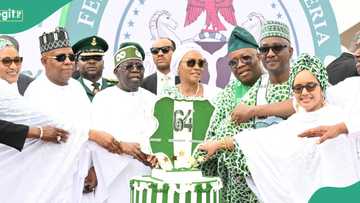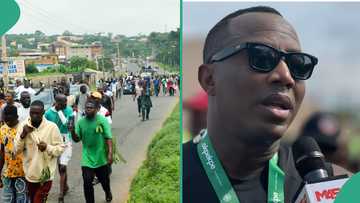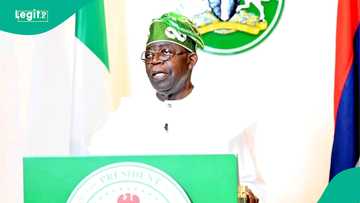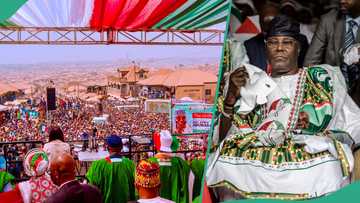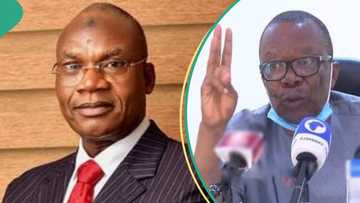Nigeria at 64: Stakeholders React as Women’s Struggle for Gender Equity Continues
- At 64, Nigeria still grapples with gender equity challenges, particularly the implementation of the 35% affirmative action for women in political and decision-making positions
- Despite years of advocacy, women's political participation has not significantly improved, with women occupying only 3.1% of elected positions in the National Assembly as of 2023
- Stakeholders such as Auwal Rafsanjani, a civil society leader, and Segun Showunmi, a PDP chieftain, told Legit.ng how the issue can be addressed
As Nigeria marks its 64th Independence, the nation continues to grapple with gender equity challenges, particularly the implementation of the 35% affirmative action for women.
This policy, aimed at increasing female representation in political and decision-making positions, remains an unfulfilled promise despite over two years of advocacy.
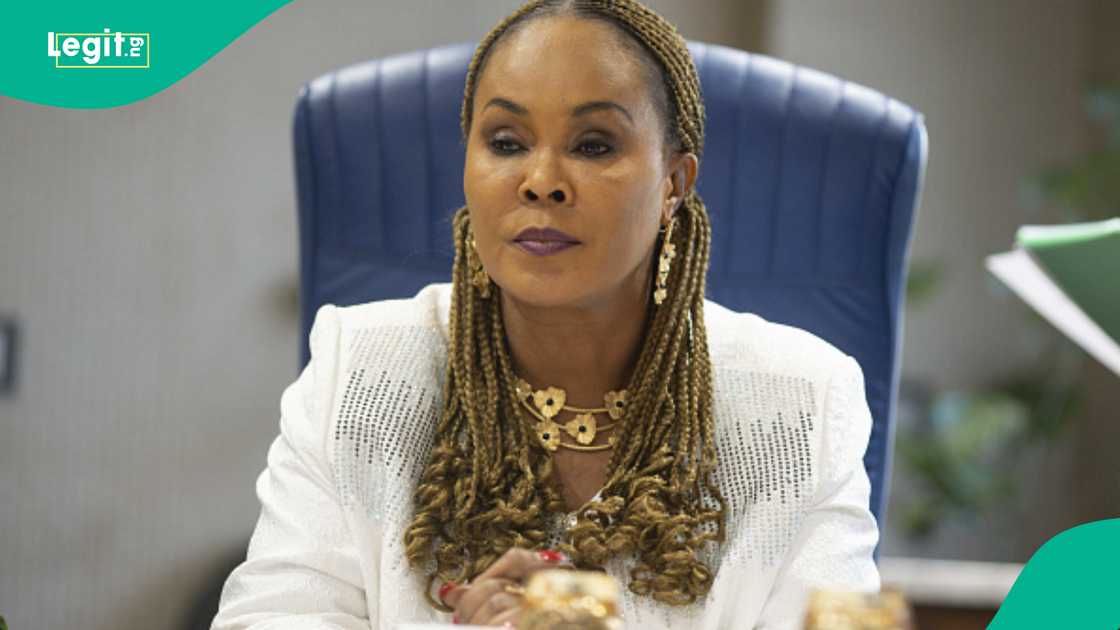
Source: Getty Images
While progress has been made in some sectors, setbacks and systemic obstacles hinder the full realisation of this objective.
The journey toward achieving 35% affirmative action for women began in earnest in 2006, when Nigeria adopted the National Gender Policy. This policy called for women to occupy 35% of elected and appointed positions in government. Despite the judiciary's directive to enforce this policy in 2022, women's political participation has not significantly improved.
Women's low representation at NASS
According to the Inter-Parliamentary Union (IPU), as of 2023, women account for only 3.1% of elected officials in the National Assembly, with four women in the Senate and 16 in the House of Representatives, three of them from Anambra State alone.
The Nigeria Bureau of Statistics (NBS) also confirmed that this represents a downward shift compared to the 2019 elections when women held only 6.2% of seats in the National Assembly, which is still far from the 35% benchmark.
The situation is even more dire at the state level, with women occupying less than 5% of state legislative positions.
Rafsanjani blames lack of political will
Auwal Rafsanjani, the Chairman of the Board of Amnesty International Nigeria, offered a stark assessment of women's inclusion in Nigerian politics.
He described the situation as one marked by a lack of "serious structural political will" to mainstream women into the political system.
Statistics support this view: despite the 35% affirmative action ruling, women's representation in key political positions remains minimal.
The political system in Nigeria continues to marginalise women, often relegating them to the position of "woman leader" within political parties. This token representation fails to challenge the broader patriarchal structures that dominate Nigerian politics.
Rafsanjani noted:
"Women have been reduced basically only to the office of a woman leader. You will hardly find women in other positions within the political parties."
Financial barriers and violence
The high cost of political participation is another significant barrier for women. According to Rafsanjani, many women are "edged out" of the political system due to the exorbitant fees required to obtain nomination forms and the necessity of "settling" party leaders.
In the 2023 elections, the cost of presidential nomination forms ranged from ₦30 million to ₦100 million, sums that are often prohibitive for female candidates.
In addition to financial challenges, women also face violence and blackmail during campaigns. The Nigerian political landscape is fraught with danger, and women are often the targets of violence and intimidation.
Rafsanjani pointed out:
"During the election, because everything is monetised... they do not have the minds to pay to kill, to pay some people to kill other political opponents."
PDP chieftain Segun Showunmi speaks
Segun Showunmi, a former governorship candidate for Ogun state on the Peoples Democratic Party (PDP) platform, echoed Rafsanjani's concerns and pointed to some positive developments.
He highlighted that in his party, women are offered nomination forms at a discounted rate, paying only 10% of the full cost. Despite these concessions, Showunmi admitted that women still face significant challenges when competing against male candidates.
"When we bring a woman in competition with a man, you would expect that women will then instantly fall behind the women. But that's not what we find practically," Showunmi said, acknowledging the complexities of gender dynamics in Nigerian politics.
This observation is supported by data from the Independent National Electoral Commission (INEC), which shows that while women make up a significant portion of registered voters, their political representation remains disproportionately low.
Global comparisons: Nigerian women and others
Nigeria's struggle with women's political inclusion is not unique but starkly contrasts global trends. Countries like Sweden and New Zealand have implemented robust gender equality policies, resulting in high levels of female participation in politics.
In Sweden, women hold 47% of parliamentary seats, while in New Zealand, women make up 49% of the House of Representatives.
These countries have achieved gender parity through a combination of legislation, advocacy, and cultural change. In Nigeria, however, the slow pace of progress suggests that more needs to be done.
Showunmi believes increased advocacy and reduced political violence could help bridge the gap.
"We need to make sure that we reduce the violence involved so that we don't force them to begin to operate in areas that are not the most efficient for them," he said.
Women's representation: The path forward
As Nigeria celebrates its Independence, the unfulfilled promise of gender parity remains a glaring omission in the nation's democratic journey. The 35% affirmative action ruling was a step in the right direction, but its lack of implementation has stifled progress. To achieve true political inclusion for women, Nigeria must go beyond tokenism and address the structural barriers that prevent women from fully participating in the political process.
Rafsanjani emphasised the need for legal reforms to create a more inclusive political environment similar to what exists in other parts of the world.
"The legal framework that will help to make women have affirmative action... like you see in other parts of the world, must be enforced," he argued.
For Showunmi, the solution lies in greater intentionality and reducing the obstacles women face in the political arena.
"The world has changed, and we must change with it. If we do not treat one office as more important than another, states will not find it difficult to nominate women," he concluded.
As Nigeria looks to the future, the question remains: will the nation finally embrace the full political potential of its women, or will the 35% affirmative action continue to be a hollow promise?
Why Nigeria needs more women in governance
Earlier, Legit.ng reported that Barr. Juliet Isi Ikhayere, a House of Reps candidate in the 2023 elections, highlighted the need for deliberate efforts to empower women politically, citing societal and cultural barriers as key obstacles.
Also, former Kaduna senator Shehu Sani spoke to Legit.ng about why the Nigerian government has failed to implement the law reserving 35% of public offices for women.
PAY ATTENTION: Сheck out news that is picked exactly for YOU ➡️ find the “Recommended for you” block on the home page and enjoy!
Source: Legit.ng

Nurudeen Lawal (Head of Politics and Current Affairs Desk) Nurudeen Lawal is an AFP-certified journalist with a wealth of experience spanning over 8 years. He received his B/Arts degree in Literature-in-English from OAU. Lawal is the Head of the Politics/CA Desk at Legit.ng, where he applies his expertise to provide incisive coverage of events. He was named the Political Desk Head of the Year (Nigeria Media Nite-Out Award 2023). He is also a certified fact-checker (Dubawa fellowship, 2020). Contact him at lawal.nurudeen@corp.legit.ng or +2347057737768.

Auwal Musa Rafsanjani (Human rights activist) Auwal Musa Rafsanjani is the chairman of the Board of Amnesty International, Nigeria, and executive director of the Civil Society Legislative Advocacy Centre (CISLAC). Rafsanjani has been a member of Civil Liberties Organization and a member of The Center for Democracy and Human Rights. He was a founding member of Campaign for Democracy, led by late Beko Ransome Kuti, Democratic Alternative, also a member and coordinator of United Action for Democracy (UAD) led by Olisa Agbakoba.


